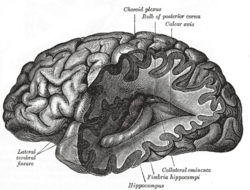Neurochemistry
Neurochemistry is the study of chemicals, including neurotransmitters and other molecules such as psychopharmaceuticals and neuropeptides, that control and influence the physiology of the nervous system. This field within neuroscience examines how neurochemicals influence the operation of neurons, synapses, and neural networks. Neurochemists analyze the biochemistry and molecular biology of organic compounds in the nervous system, and their roles in such neural processes including cortical plasticity, neurogenesis, and neural differentiation.
History
While neurochemistry as a recognized science is relatively new, the idea behind neurochemistry has been around since the 18th century. Originally, the brain had been thought to be a separate entity apart from the peripheral nervous system. Beginning in 1856, there was a string of research that refuted that idea. The chemical makeup of the brain was nearly identical to the makeup of the peripheral nervous system.[1] The first large leap forward in the study of neurochemistry came from Johann Ludwig Wilhelm Thudichum, who is one of the pioneers in the field of "brain chemistry." He was one of the first to hypothesize that many neurological illnesses could be contributed to an imbalance of chemicals in the brain. He was also one of the first scientists to believe that through chemical means, the vast majority of neurological diseases could be treated, if not cured.[2]
In the 1950s, neurochemistry became a recognized scientific research discipline.[3] The founding of neurochemistry as a discipline traces it origins to a series of "International Neurochemical Symposia", of which the first symposium volume published in 1954 was titled Biochemistry of the Developing Nervous System.[4] These meetings led to the formation of the International Society for Neurochemistry and the American Society for Neurochemistry. These early gatherings discussed the tentative nature of possible neurotransmitter substances such as acetylcholine, histamine, substance P, and serotonin. By 1972, ideas were more concrete.
One of the first major successes in using chemicals to alter brain function was the L-DOPA experiment. In 1961, Walter Burkmayer injected L-DOPA into a patient with Parkinson's Disease. Shortly after injection, the patient had a drastic reduction in tremors, and they were able to control their muscles in ways they hadn't been able to in a long time. The effect peaked within 2.5 hours and lasted approximately 24 hours.[1]
Neurochemistry of PTSD
One of the major areas of research within neurochemistry is looking at how post-traumatic stress disorder alters the brain. Neurotransmitter level fluctuations can dictate whether a PTSD episode occurs and how long the episode lasts. Dopamine has less of an effect than norepinephrine. Different neurochemicals can affect different parts of the brain. This allows drugs to be used for PTSD to not have an undesired effect on other brain processes. An effective medication to help alleviate nightmares associated with PTSD is Prazosin.[5]
See also
- List of neurochemists
- Molecular neuroscience
- Neuroendocrinology
- Neurogenesis
- Neuroimmunology
- Neuromodulation
- Neuropharmacology
- Neuroplasticity or Synaptic plasticity
- Signal transduction
References
- Foley, P. (2007), "Succi nervorum: a brief history of neurochemistry", Neuropsychiatric Disorders an Integrative Approach, Journal of Neural Transmission. Supplementa, 72, Springer Vienna, pp. 5–15, doi:10.1007/978-3-211-73574-9_2, ISBN 9783211735732
- Thudichum, J. L. W. (1962). A treatise on the chemical constitution of the brain. Archon Books. OCLC 1030309150.
- Agranoff, Bernard W. (22 July 2003). History of Neurochemistry. Encyclopedia of Life Sciences. doi:10.1038/npg.els.0003465. ISBN 978-0470016176.
- Siegel, George J.; Albers, R.W.; Brady, S.T.; Price, D.L. (2006). Basic Neurochemistry, 7th Ed. Academic Press. ISBN 978-0-12-088397-4.
- Arnsten, Amy F.T.; Raskind, Murray A.; Taylor, Fletcher B.; Connor, Daniel F. (January 2015). "The effects of stress exposure on prefrontal cortex: Translating basic research into successful treatments for post-traumatic stress disorder". Neurobiology of Stress. 1: 89–99. doi:10.1016/j.ynstr.2014.10.002. ISSN 2352-2895. PMC 4244027. PMID 25436222.
External links
- Basic Neurochemistry online, searchable textbook.
- American Society for Neurochemistry
